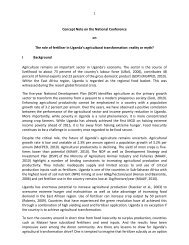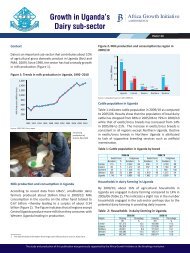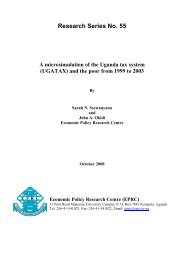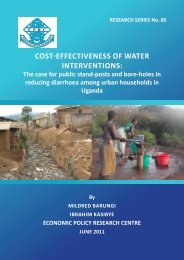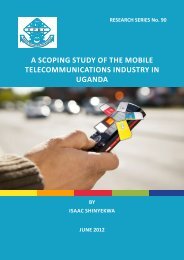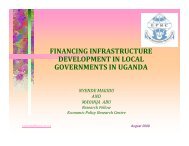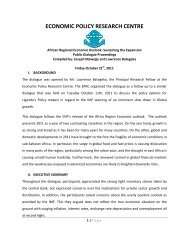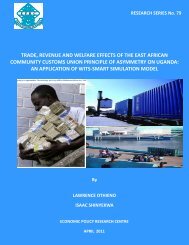The Political Context of Financing Infrastructure Development in ...
The Political Context of Financing Infrastructure Development in ...
The Political Context of Financing Infrastructure Development in ...
You also want an ePaper? Increase the reach of your titles
YUMPU automatically turns print PDFs into web optimized ePapers that Google loves.
<strong>The</strong> <strong>Political</strong> <strong>Context</strong> <strong>of</strong> <strong>F<strong>in</strong>anc<strong>in</strong>g</strong> <strong>Infrastructure</strong> <strong>Development</strong> <strong>in</strong> Local Government<br />
<strong>of</strong> decentralisation but also recommends how the policy could be implemented. <strong>The</strong> study<br />
po<strong>in</strong>ts out that Uganda’s decentralisation policy was be<strong>in</strong>g considered <strong>in</strong> the context <strong>of</strong><br />
its Structural Adjustment Program for macroeconomic reform the pr<strong>in</strong>cipal goals <strong>of</strong> which<br />
are improved economic growth through the operation <strong>of</strong> the market mechanisms. On the<br />
central-local relationship which are central <strong>in</strong> the nature <strong>of</strong> decentralization, the World Bank<br />
report recommended that central M<strong>in</strong>istries should reta<strong>in</strong> responsibility for handl<strong>in</strong>g security<br />
matters, national plann<strong>in</strong>g, national unity, defence, immigration, foreign affairs and clearly<br />
def<strong>in</strong>ed national projects. <strong>The</strong> report emphatically recommended that all other government<br />
policies would be implemented through district councils. <strong>The</strong> report also <strong>in</strong>dicated that under<br />
this arrangement, the central government would issue regulations and advice to ensure<br />
appropriate standards and adm<strong>in</strong>istrative efficiency and that both elected and appo<strong>in</strong>ted<br />
<strong>of</strong>ficials would be held accountable by the electorate for their actions. <strong>The</strong> report put it that<br />
the new local government system sought to take the decision mak<strong>in</strong>g function <strong>in</strong> respect <strong>of</strong> all<br />
matters <strong>of</strong> local significance away from the centre to closer to the areas where the decisions<br />
are implemented by devolv<strong>in</strong>g to the local unit <strong>of</strong> adm<strong>in</strong>istration functions which were at<br />
that time centralized <strong>in</strong> government m<strong>in</strong>istries. It is therefore pert<strong>in</strong>ent to note that these<br />
two reports <strong>of</strong>fered guidel<strong>in</strong>e for formal decentralization <strong>in</strong> Uganda, although the Resistance<br />
Councils statute <strong>of</strong> 1987 can be viewed as the proto-legislation for decentralization.<br />
Formal decentralization <strong>in</strong> Uganda can be traced from 1987 when the Resistance Councils<br />
statute was enacted. Mutabwire (2001) noted that <strong>in</strong> 1987, aris<strong>in</strong>g out <strong>of</strong> the recommendations<br />
<strong>of</strong> the Commission <strong>of</strong> Inquiry <strong>in</strong>to local governments, the Resistance Councils statute was<br />
enacted. He observes that it aimed at ensur<strong>in</strong>g participation <strong>in</strong> decision mak<strong>in</strong>g at the local level,<br />
mobilis<strong>in</strong>g the masses for local economic development, empower<strong>in</strong>g the masses by rais<strong>in</strong>g<br />
their political consciousness and/streaml<strong>in</strong><strong>in</strong>g adm<strong>in</strong>istration at the local level. Although<br />
this had good <strong>in</strong>tentions, it did not provide the local councils with significant authority and<br />
autonomy; neither did it bequeath these councils with oversight functions.<br />
In order to extend greater powers to the local governments, the Local Government (Resistance<br />
Councils) Statute, 1993 was enacted. This statute legalized popular participation and <strong>in</strong>deed<br />
commenced the process <strong>of</strong> decentralisation. <strong>The</strong> preamble <strong>of</strong> this statute goes thus: “A Statute<br />
to provide for the decentralization <strong>of</strong> functions, powers and services to local governments<br />
(Resistance Councils) to <strong>in</strong>crease democratic control and participation <strong>in</strong> decision-mak<strong>in</strong>g and<br />
to mobilise support for development which is relevant to local needs”. Although this statute<br />
provided a solid ground for decentralization, it did not clearly lay out the oversight functions<br />
<strong>of</strong> the Resistance Councils. In any case decentralisation is not an event but rather a process<br />
and it is a political decision rather than simply a technical affair. <strong>The</strong> current decentralization<br />
evolved from the Constituent Assembly corollary to which it was enshr<strong>in</strong>ed <strong>in</strong> the Constitution<br />
<strong>in</strong> 1995. <strong>The</strong> constitution and Local Governments Act, 1997, which is the enabl<strong>in</strong>g legislation,<br />
6<br />
Economic Policy Research Centre - EPRC






